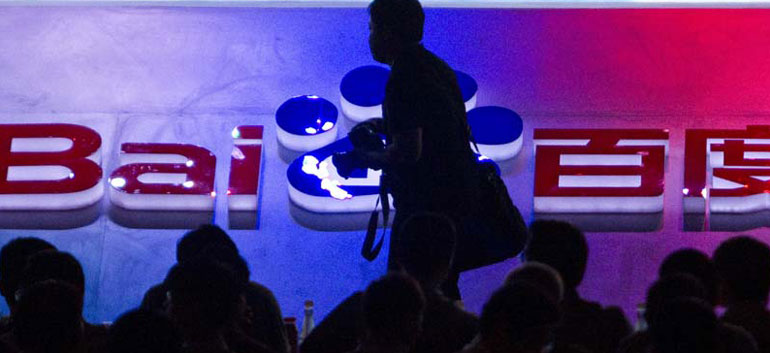Baidu attracts top partners for its ‘Android for cars’ driverless project
10 July 2017

10 July 2017
′China’s Google’ internet search giant Baidu has announced its open-source self-driving car software is now available for anyone to freely download. More than 50 partners have already joined Baidu’s Apollo project, including Daimler, Ford, supplier giants Bosch and Continental, Dutch mappers TomTom, SE Asian ride-hailing giant Grab and 11 Chinese car giants (notably not including Geely Automotive).
It follows the model Google used to make Android ubiquitous, exchanging software access in return for Baidu gathering the data and boosting utilisation of its platforms. However, it is a double-edged sword, since it also provides the technology to Baidu’s competitors. It is Baidu’s flagship attempt to make up ground to leading players including Google-linked Waymo, to which many analysts believe Baidu’s technology still lags behind. Baidu has been testing autonomous vehicles alongside Waymo and Uber in California since September last year.
The autonomous software IP is for ′restricted autonomous driving,’ is immediately usable ′out of the box’ with zero modification for one car model, the Lincoln MKZ hybrid, and can be used with small modification on several others.
Driverless cars are currently banned in China, with regulations and safety standards still being drawn up. Baidu founder announced the launch of the software last week at Baidu’s tech conference, making the announcement on video call to the conference audience from one of its self-driving cars, hailing that he was not touching the steering wheel. Beijing police swiftly launched an investigation into the founder for violating Chinese highway laws.
Collecting vast amounts of data is the key to developing effective artificial intelligence (AI) programs – specifically a subset called ′deep learning’ – that are fundamental to autonomous driving software.
If Baidu manages to attract a vast number of players, it could therefore quickly overtake Waymo’s vast current data gathering advantage and become the leading player in the field. However, this all depends on western companies trusting the Chinese state-linked company as a full partner, as was crucial in Google managing to make its Android platform ubiquitous. Chinese manufacturers aligning with the leading Chinese autonomous software provider is expected. Several of Apollo’s members already have separate cooperation agreements in place with Waymo and other driverless car providers, so are effectively hedging their bets, as well as pooling expertise.
Market research company IDC analyst Zhang Zhuo was upbeat about Baidu’s potential. Baidu is widely regarded as the Chinese leader in artificial intelligence technology, considered on a level with IBM and Google in the field. He told the Financial Times: ′In the long run, if Baidu persists with its strategy of creating an open AI platform and an AI ecosystem, this will be good for revenues.’ He was very bullish about Baidu’s potential, saying that in five years’ time, he expected Baidu’s AI business to become its main source of revenue, overtaking search-engine advertising.
In recent years, Baidu has been struggling against more smartphone-strong Chinese search competitors Alibaba and Tencent, with its core search engine and online advertising businesses dipping. It is focussing on AI in the hopes it will become a future source of revenue growth for the company.
The next phase of Baidu’s software rollout will be this December, which will upgrade the autonomous software from ′restricted autonomous driving’ to software capable of operating in quiet urban environments. Urban environments are regarded as the most challenging for autonomous systems, due to the large number of obstacles, such as cyclists, pedestrians and unusual road layouts.
Baidu’s next landmark phase of its project will be in 2020 when it launches its IP for ′fully autonomous driving capabilities on highways and open city roads.’
Baidu’s partnerships now cover virtually every automotive field. Netherlands-based TomTom said it would be supporting Baidu with high-definition mapping for Western Europe and the US regions. This helps Baidu reach beyond its core Asian markets. TomTom is one of few mapping providers not linked to another autonomous tech developer, with Google and Apple having their own driverless programmes, and mapper HERE linked to Intel’s Mobileye.
On the hardware side, Baidu also announced it was forming an alliance with Silicon Valley chipmaker giant Nvidia, which will be providing the hardware on which Baidu’s AI platforms will run. This involves Baidu using the same Nvidia Drive PX autonomous ′platform’ (chip) being used by many carmakers including Volvo, Tesla, Daimler’s Mercedes and Toyota.
Much like Apple and Google, Baidu’s self-driving car ambitious have hit a number of roadblocks, including a much-lauded partnership with BMW being abandoned for undisclosed reasons last November. However, unlike Apple and Google, it has not reneged on its ambitions to make its own Apollo car, maintaining its stated goal to release a driverless car next year in 2018, and beginning mass production in 2021.
Baidu’s AI framework, called Paddle Paddle, competes against Google’s TensorFlow and Facebook’s Caffe2. These provide developers with computing power and AI algorithm libraries. Baidu’s data is generated largely from its billions of daily search engine and map queries, which will be shared with developers.
Given the vast data Baidu has access to through China’s 1.4 billion people (a fifth of the global population), it would be unwise to rule out Baidu playing a considerable role in the world’s autonomous future.
Photograph courtesy of Baidu